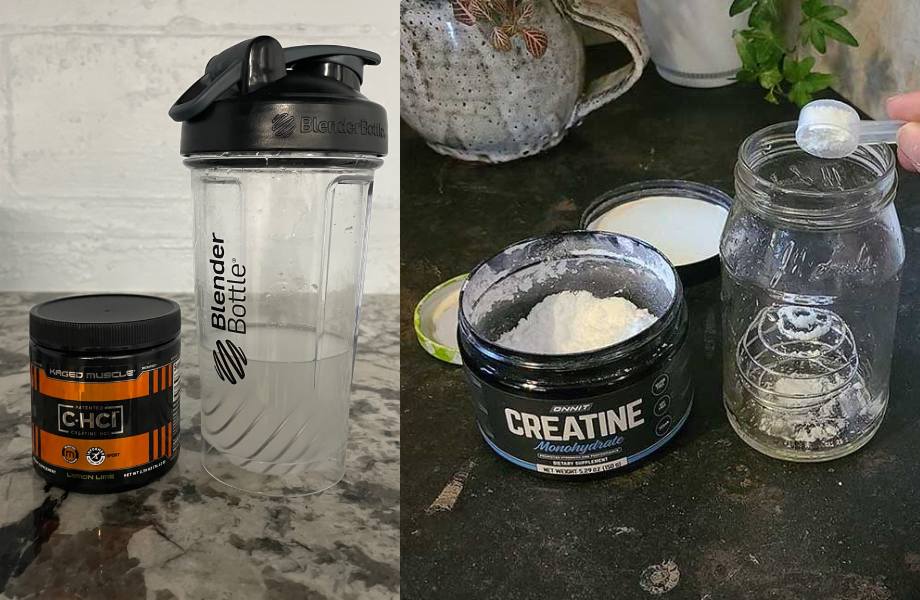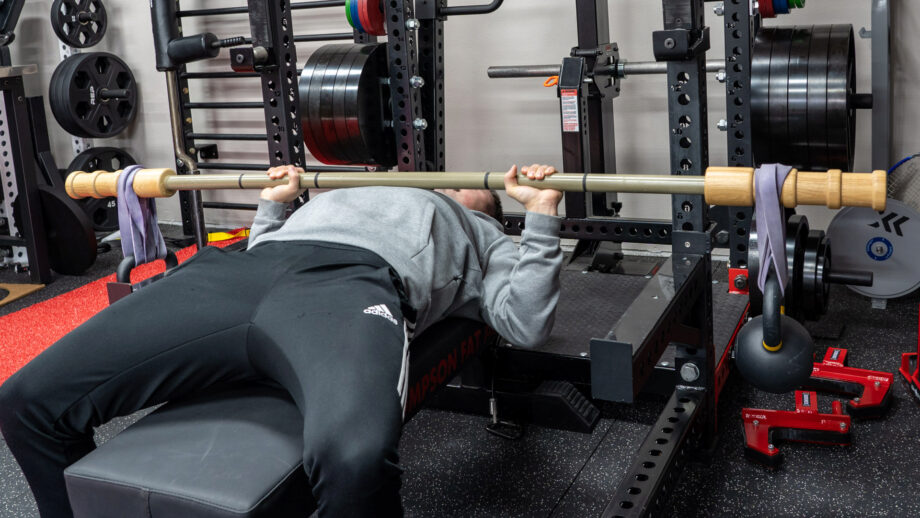Next to the best whey protein, creatine is one of the most popular workout supplements. Some people take it to enhance general athletic performance while others are after the strength gains creatine can help support. Regardless of your fitness goals, you may have seen various forms of creatine in different supplements.
Creatine monohydrate is the most common, and most-often-studied form, but there are other types, like creatine hydrochloride (or creatine HCl) that have gained popularity in recent years. Of course, if you’re taking a supplement, you want to make sure you’re getting the most out of it, so which one should you take for maximum benefit? In this guide, we’ll dig into everything you need to know about creatine HCl vs monohydrate to help you make a decision.
Medical disclaimer: This article is intended for educational and informational purposes only. It is not intended as a substitute for medical advice. For health advice, contact a licensed healthcare provider.
What Is Creatine?
Let’s start by answering the basic question: What is creatine?
Creatine is an amino acid that’s concentrated mostly in your muscle cells—about 95% of the creatine1 in your body is stored in your fast-twitch skeletal muscle, specifically.
These are the muscles that help with short, powerful bursts of energy during high-intensity workouts2 like sprinting. They give you more force, but they also fatigue more quickly than slow-twitch muscle fibers, which carry you through endurance exercises, like long-distance running. The remaining 5% of the creatine in your body is dispersed throughout the brain and testes.
RELATED: Best Long-Distance Running Shoes
Your body can make creatine with the help of your liver, pancreas, and kidneys, but you can also get it from some foods (meat and fish) and creatine supplements. In your body, creatine is converted to creatine phosphate or phosphocreatine, and then stored in your muscles where it’s used to make adenosine triphosphate (ATP), your body’s major source of energy.
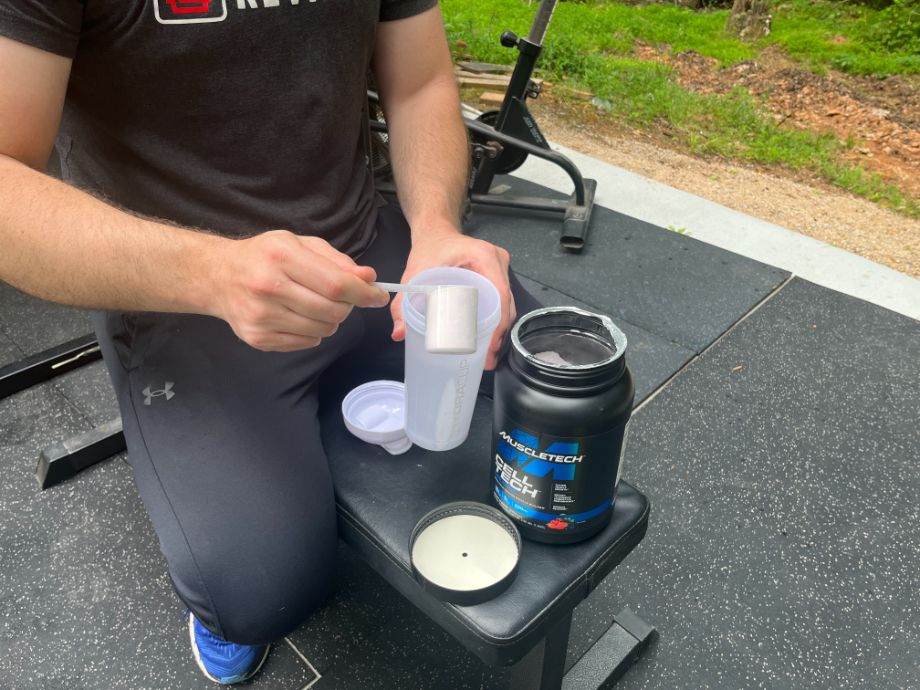
The creatine stores in your muscles are mainly used to maintain the concentration of ATP3 in your muscles when you need it for short bursts of exercise.
One of the other major benefits of creatine is its effect on strength and performance in resistance training. Studies2 show that creatine has a positive effect on muscle growth, strength, and sports performance when compared to a placebo. In other words, it may help you build muscle and increase strength more than resistance training alone.
In one meta-analysis4 that dug into 22 different studies, researchers found that the average increase in muscle strength was 8 percent greater with creatine supplementation than with just resistance training alone; weightlifting performance was 14 percent greater.
Types of Creatine in Supplements
As with pretty much every sports nutrition supplement, there are different kinds of creatine. Not all of these are well-studied, but the most popular forms of creatine are:
Creatine Monohydrate
This is currently the “gold standard” type of creatine. Creatine monohydrate supplements contain creatine that’s been chemically bonded to a water molecule. They’re the most popular and the most studied (more on that later). Creatine monohydrate is about 90% creatine by weight5.
Creatine HCl
Creatine HCl is a creatine salt that combines creatine molecules with hydrochloric acid—the same type of acid that’s in your stomach and helps with digestion. Because of this, many people think creatine HCl has better absorption than other forms (more on that later, too). Creatine HCl is about 78% creatine by weight6.
Creatine Anhydrous
Creatine anhydrous is creatine monohydrate with the water removed. It has more creatine per gram—it’s 100% creatine by weight. However, it’s difficult to find it in supplemental form.
Creatine Magnesium Chelate
Creatine magnesium chelate is creatine that’s been “chelated,”or chemically bonded, with magnesium instead of water. The theory here is that the magnesium can help with absorption and also serve as a bioavailable form of the mineral. However, studies7 don’t show a difference between this type of creatine and creatine monohydrate.
Creatine Ethyl Ester
Creatine ethyl ester is creatine monohydrate with a compound called an ester attached. Without giving you flashbacks to your biochemistry class, an ester is made from an acid and is thought to increase bioavailability of creatine. However, research8 shows that creatine ethyl ester isn’t as effective as creatine monohydrate in increasing creatine levels in the blood or muscles, and doesn’t have the same positive effects on strength and body composition.
Buffered Creatine (Kre-Alkalyn)
Buffered creatine is monohydrate that’s been mixed with some kind of alkaline substance, like magnesium, sodium bicarbonate (baking soda), or soda ash, to increase its pH. Like other forms of creatine, the theory is that this helps increase its bioavailability and effectiveness. But as is the story with creatine esters, buffered creatine has also been shown to be inferior9 to creatine monohydrate.
Creatine Monohydrate vs HCl
Now that you have the basic rundown of the types of creatine, let’s get into the nitty gritty: creatine monohydrate vs HCl.
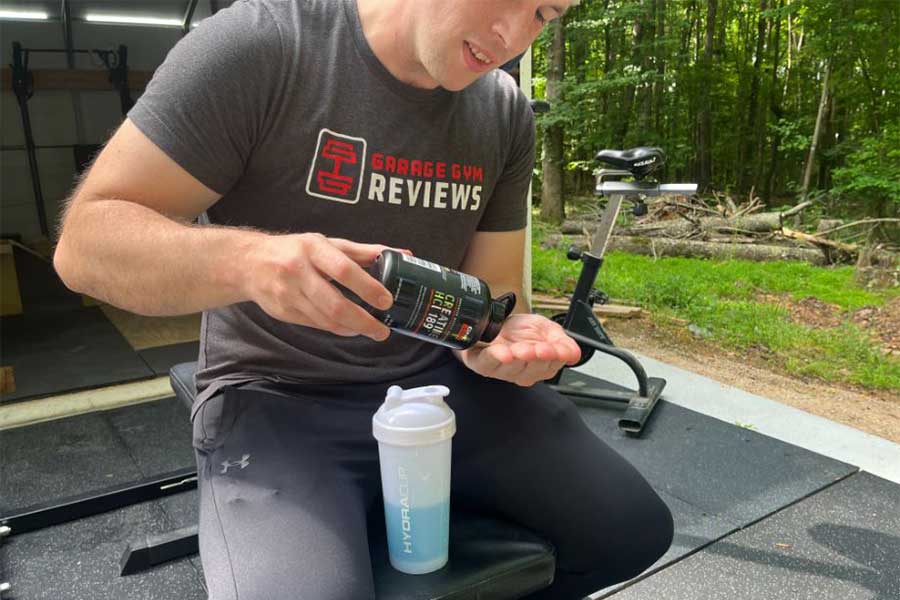
Before diving in, it’s important to point out that while there’s a ton of scientific evidence backing the effectiveness of creatine monohydrate, creatine HCl hasn’t been studied as extensively. There’s also not a lot of research comparing the two side-by-side. That being said, there are a few studies out there.
What Does the Science Say?
In one 2015 study that was published in Food and Nutrition Sciences10, researchers compared the effects of two different doses of creatine HCl (5 grams and 1.5 grams daily) with creatine monohydrate (5 grams daily). They measured bench press performance and body composition, including lean body mass) at the start of the experiment and after 4 weeks.
After the study period was over, researchers concluded that both types of creatine improved athletic performance to the same degree, but that creatine HCl was the only one to positively affect body composition. The group taking 5 grams of creatine HCl daily was the only group that saw increases in lean muscle mass.
However, another 2019 study published in the International Journal of Food and Nutrition Research11 found that both types of creatine increased lean muscle mass and strength to a similar degree, but creatine HCl did have a slight edge when it came to fat reduction.
Researchers from one more study published in the Journal of Strength and Conditioning Research12 set out to compare the effectiveness of the alternative forms of creatine to creatine monohydrate. After digging through the research, they didn’t even include creatine HCl, stating that there’s not enough clinical research on this particular form to even make a call.
Based on the limited research out there, you could reasonably say that the two types of creatine seem to have a similar effect on performance and strength, so how do you choose which one to use? Let’s break down the pros and cons.
Pros and Cons of Creatine Monohydrate
Creatine monohydrate is currently the gold standard when it comes to creatine supplements. It’s often considered the most effective form, and has a whopping 99% absorption rate13.
Thanks to a boatload of scientific studies on creatine monohydrate, we know that it works and that it’s safe for both short- and long-term use14.
One of the major downsides of creatine monohydrate is that it’s not as soluble as other forms, so you need a good amount of water to properly dissolve it. This, and the fact that creatine pulls water into the muscles to maintain sodium balance13, can prompt water retention, leading to temporary weight gain, especially if you do a loading phase.
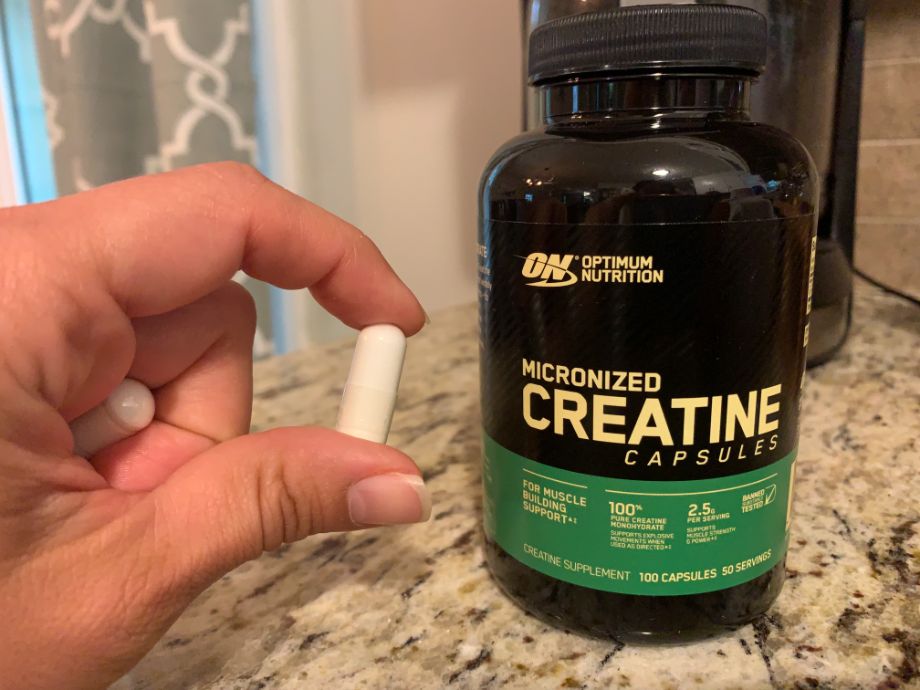
On that note, while many people choose to do a creatine loading phase—where you’ll take about 20 to 25 grams of creatine15 daily for one week, then drop down to a maintenance dose of about 5 grams daily—you don’t have to16. Loading just helps saturate the muscles more quickly so you can start to feel and see the effects sooner.
But here’s where things get a little trickier: While water weight and bloating may not be part of your fitness goals, research shows that this water retention may actually have ergogenic benefits.
According to older research17, cell swelling (which happens when water is pulled into the cell) can actually stimulate protein synthesis, which is necessary for muscle growth. On the flip side, cell shrinkage, which happens when water leaves the cell, can trigger the breakdown of proteins. All this to say: The water retention may actually be a good thing.
Pros:
- Extensively studied and known to be safe and effective
- Very high creatine by weight
Cons:
- Not as soluble as other forms
- More likely to cause water retention and discomfort
Pros and Cons of Creatine HCl
OK, now let’s get into creatine HCl. This form of creatine was developed to help mitigate this common side effect of creatine: water retention and resulting (temporary) weight gain.
The chemical makeup makes it more soluble in water18 than creatine monohydrate, so you need less liquid to dissolve it. Because of this, it can be more palatable and easier to take. You don’t have to chug a bunch of water to get it down. For comparison, you’d need about 13 to 20 ounces10 of water to dissolve 5 to 10 grams of creatine monohydrate, but less than 1 ounce to dissolve the same amount of creatine HCl.
There was also one study19 that showed that creatine HCl may be better absorbed than creatine monohydrate and that it’s more bioavailable. In theory, this would mean that you need a smaller amount of creatine HCl to produce the same effects of creatine monohydrate in higher doses. But the major callout here is that this study was done on rats, so we can’t really say whether it would have the same effect on humans.
Also, keep in mind that in the Food and Nutrition Sciences study above, the 5-gram dose of creatine HCl was more effective than the 1.5-gram dose, so at this point, this is just a theory.
Because creatine HCl is supposed to have superior bioavailability, some say another benefit is that it doesn’t require a loading phase20 to build up your muscle creatine. As mentioned, the loading phase is when most people experience potential side effects, like water retention, bloating, and cramping, so skipping this could be beneficial for those who are sensitive to creatine’s effects.
But it’s worth reiterating that creatine HCl isn’t extensively tested. In fact, there isn’t much research on it at all. So while there are some promising results from the studies that are out there, there isn’t enough evidence to make any solid claims about it—a major con for us.
Pros:
- Has better water solubility than other forms to mitigate side effects
Cons:
- Not as well-studied
- Lower creatine by weight
Final Thoughts: Creatine HCl vs Monohydrate
Creatine HCl shows some promise, and it could be a good option if weight loss is your main goal and/or you want to take smaller doses, but the pool of available research is still lacking. On the other hand, creatine monohydrate has been extensively studied and we know with certainty that it’s safe and effective.
At the end of the day, you may be able to get similar results from these sports supplements, but we just don’t know for sure. Because of that, we recommend sticking with creatine monohydrate—for now.
Q&A: Creatine HCl vs Monohydrate
Which Form of Creatine is Best?
Creatine monohydrate is the best form of creatine. While there’s promising research around creatine HCl, monohydrate has been the most extensively studied and remains the gold standard for now.
Does Creatine HCl Increase Strength?
Some studies show that creatine HCl can increase strength to the same extent as creatine monohydrate, but the truth is there just hasn’t been a ton of research12 to wholeheartedly back up this type of creatine. Because we know creatine monohydrate is highly effective, we recommend choosing it whenever possible.
What Type Of Creatine Do Bodybuilders Use?
Most bodybuilders use creatine monohydrate, since it’s the most studied and most commonly available form. Some use creatine anhydrous, which is creatine monohydrate with the water removed and 100% creatine by weight.
These statements have not been evaluated by the Food and Drug Administration. This product is not intended to diagnose, treat, cure, or prevent any diseases.
References
1. Kreider, RB, Kalman, DS, Antonio, J, et al. International Society of Sports Nutrition position stand: safety and efficacy of creatine supplementation in exercise, sport, and medicine. J Int Soc Sports Nutr. 2017;14:18. doi:10.1186/s12970-017-0173-z
2. Wu, SH, Chen, KL, Hsu, C, et al. Creatine supplementation for muscle growth: a scoping review of randomized clinical trials from 2012 to 2021. Nutrients. 2022;14(6):1255. doi:10.3390/nu14061255
3. Brody, T. Regulation of energy metabolism. Nutritional biochemistry. 1999;157-271. doi: 10.1016/B978-012134836-6/50007-X
4. Rawson, ES, Volek, JS. Effects of creatine supplementation and resistance training on muscle strength and weightlifting performance. J Strength Cond Res. 2003;17(4):822-831. doi:10.1519/1533-4287(2003)017
5. National Center for Biotechnology Information. PubChem compound summary for CID 80116, creatine monohydrate. Accessed June 22, 2023.
6. National Center for Biotechnology Information. PubChem compound summary for CID 134732, creatine hydrochloride. Accessed June 22, 2023.
7. Selsby, JT, DiSilvestro, RA, Devor, ST. Mg2+-creatine chelate and a low-dose creatine supplementation regimen improve exercise performance. J Strength Cond Res. 2004;18(2):311-315. doi:10.1519/R-13072.1
8. Spillane, M., Schoch, R., Cooke, M. et al. The effects of creatine ethyl ester supplementation combined with heavy resistance training on body composition, muscle performance, and serum and muscle creatine levels. J Int Soc Sports Nutr. 2009; 6(6). doi.org/10.1186/1550-2783-6-6
9. Jagim, AR, Oliver, JM, Sanchez, A, et al. A buffered form of creatine does not promote greater changes in muscle creatine content, body composition, or training adaptations than creatine monohydrate. J Int Soc Sports Nutr. 2012;9(1):43. doi:10.1186/1550-2783-9-43
10. De França, E, et al. Creatine HCl and creatine monohydrate improve strength but only creatine HCl induced changes on body composition in recreational weightlifters. Food Nutr Sci. 2015;6. doi: 10.4236/fns.2015.617167.
11. Ayme Fernandes Yoshioka, C, et al. Comparison between creatine monohydrate and creatine HCl on body composition and performance of the Brazilian Olympic team. Int J Food Nutr Res. 2019;3:28.
12. Fazio, C, Elder, C; Harris, M. Efficacy of alternative forms of creatine supplementation on improving performance and body composition in healthy subjects: a systematic review. J. Strength Cond. Res. 2022;36(9):2663-2670. doi: 10.1519/JSC.0000000000003873
13. Antonio, J, Candow, D.G., Forbes, S.C. et al. Common questions and misconceptions about creatine supplementation: what does the scientific evidence really show?. J Int Soc Sports Nutr. 2021;18(13). doi: 10.1186/s12970-021-00412-w
14. Hall, M, Manetta, E, Tupper, K. Creatine supplementation: an update. Curr Sports Med Rep. 2021;20(7):338-344. doi:10.1249/JSR.0000000000000863
15. Gann, JJ, McKinley-Barnard, SK, Andre, TL, Schoch, RD, Willoughby, DS. Effects of a traditionally-dosed creatine supplementation protocol and resistance training on the skeletal muscle uptake and whole-body metabolism and retention of creatine in males. J Int Soc Sports Nutr. 2015;12(Suppl 1):P2. doi:10.1186/1550-2783-12-S1-P2
16. Hall, M, Trojian, TH. Creatine supplementation. Curr Sports Med Rep. 2013;12(4):240-244. doi:10.1249/JSR.0b013e31829cdff2
17. Waldegger, S, Busch, GL, Kaba, NK, et al. Effect of cellular hydration on protein metabolism. Miner Electrolyte Metab. 1997;23(3-6):201-205.
18. Gufford, B, Sriraghavan, K, Miller, N, Miller, D, Gu, X, Vennerstrom J, Robinson, D. Physicochemical characterization of creatine N-methylguanidinium salts. J. Diet. Suppl. 2010; 7(3):240-252. doi: 10.3109/19390211.2010.491507
19. Alraddadi, EA, Lillico, R, Vennerstrom, JL, Lakowski, TM, Miller, DW. Absolute oral bioavailability of creatine monohydrate in rats: debunking a myth. Pharmaceutics. 2018;10(1):31. doi:10.3390/pharmaceutics1001003120.
20. Tayebi, M, Arazi, H. Is creatine hydrochloride better than creatine monohydrate for the improvement of physical performance and hormonal changes in young trained men?Sci Sports. 2020; 35(5):135-141. doi: 10.1016/j.scispo.2019.07.013.


